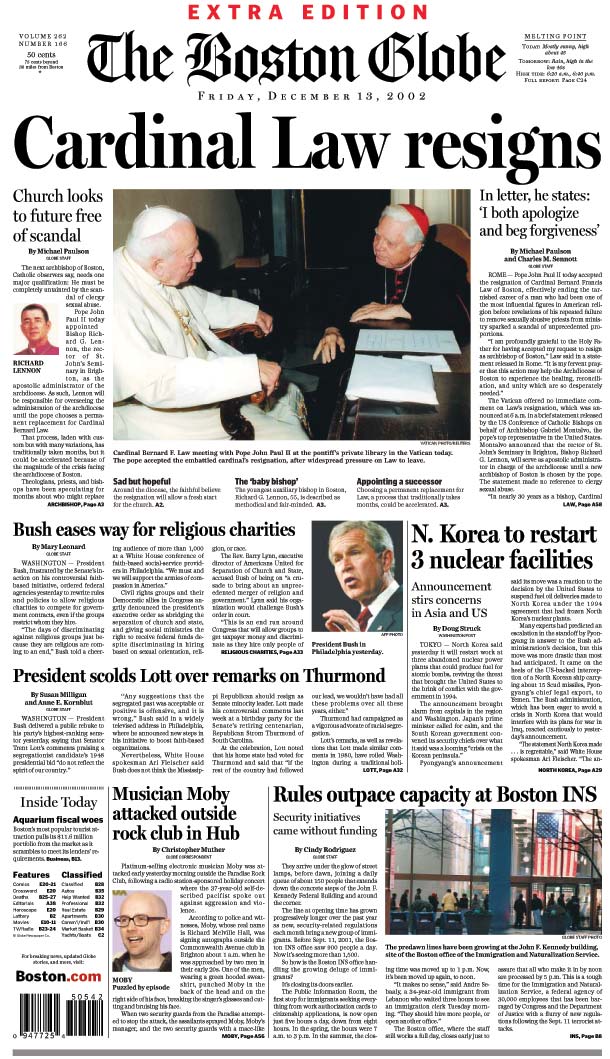 The well-publicized struggle between Globe unions and the NYTimes has been, for the most part, depicted as a David vs. Goliath kind of fight: The Globe, the scrappy little paper in the scrappy little city that could, against a big-time news conglomerate. In general, we like to root for the underdog, though it doesn't help that the Globe's largest of its four unions (editorial, advertising, and business office staff) voted against pay cuts after the other three unions--representing the largely blue-collar section of the paper--ratified major concessions in an effort to keep the paper open. Here's how the Globe article explains it:
The well-publicized struggle between Globe unions and the NYTimes has been, for the most part, depicted as a David vs. Goliath kind of fight: The Globe, the scrappy little paper in the scrappy little city that could, against a big-time news conglomerate. In general, we like to root for the underdog, though it doesn't help that the Globe's largest of its four unions (editorial, advertising, and business office staff) voted against pay cuts after the other three unions--representing the largely blue-collar section of the paper--ratified major concessions in an effort to keep the paper open. Here's how the Globe article explains it:
In the last two weeks, three of the newspaper's four major unions -- representing the mailers, the pressmen, and the delivery truck drivers -- ratified concessions giving $10 million back to the Times Co. The Guild -- the paper's largest union representing nearly 700 editorial, advertising, and business office staff -- fell 12 votes short of ratifying another $10 million in concessions on Monday. However, the Times Co. said yesterday that it will get $10 million it needs from the Guild by imposing a 23 percent across-the-board wage cut, effective Sunday, the start of the next pay period.
I'm not, of course, actually glad to see the Globe get shut down. It means loss of
 jobs in a tight economy, and it may result in a kind of news vacuum, at least until reportage shifts to accommodate the gap. Even the fact that a second paper, the Boston Herald, covers city news won't stop this from happening. All the sources, all the politicians, public figures, public servants, and reading public that was loyal to the Globe won't suddenly defect; they're more likely to simply...kinda go away.
jobs in a tight economy, and it may result in a kind of news vacuum, at least until reportage shifts to accommodate the gap. Even the fact that a second paper, the Boston Herald, covers city news won't stop this from happening. All the sources, all the politicians, public figures, public servants, and reading public that was loyal to the Globe won't suddenly defect; they're more likely to simply...kinda go away.But as I've stated before, the traditional model of print journalism is unsustainable in a new media environment. The notion that all major cities need at least one major newspaper is no longer viable and, in lots of ways, no longer accurate. Papers once served as a community's glue, connecting people to each other when the community itself got too big for everybody to know everybody else.
Now we have lots of other new media outlets to glue a community together, and even the notion of "community" is no longer quite so bounded to geographical space.
Though we may not need or be able to support print newspapers, we absolutely still need journalism. It's time now to figure out how to harness the tremendous energy, enthusiasm, and brainpower of all the new media-journalist types by looking at how, why, and when they report on the news. It's time now to figure out how to support some sort of hybrid model that connects professional reporters with amateur (unpaid) journalists (brb plugging words linking to site http://jennamcwilliams.blogspot.com). It's time to move past the question of who killed newspapers. Journalism is dead. Long live journalism.






4 comments:
If we have lots of other new media outlets, I think we may have lots of communities, with no common thread gluing them together (sorry for the mixed metaphor). Couldn't one news organization create a place to gather them all, a place the larger community would know and recognize for that role, too? Could that be the future form of "newspapers," in whatever medium suits best for the purpose?
Hello!!!
The bloggers need journalists. They produce the news. the newspapers need to find solutions to live web.
My bloga > The Blogger > http://luishipolito.wordpress.com
Blog do Luis Hipolito > http://luishipolito.blogspot.com
Thanks!!!
Correct: My blogs: http://luishipolito.wordpress.com and http://luishipolito.blogspot.com
as with the Detroit 3 the issue is unionism failing to recognize the new economic realities. The Guild continues to demand goodies as if it still enjoyed a substantial monopoly on creating news coverage in its market.
The Guild will fail rather spectacularly I think unless Kennedy et al can persuade Obama to start handing out Federal subsidies to newspaper unions as he did with the UAW.
Who knows - maybe it will happen. I certainly never expected Obama to spend $100 billion on the UAW but he has gone ahead and done it.
Post a Comment